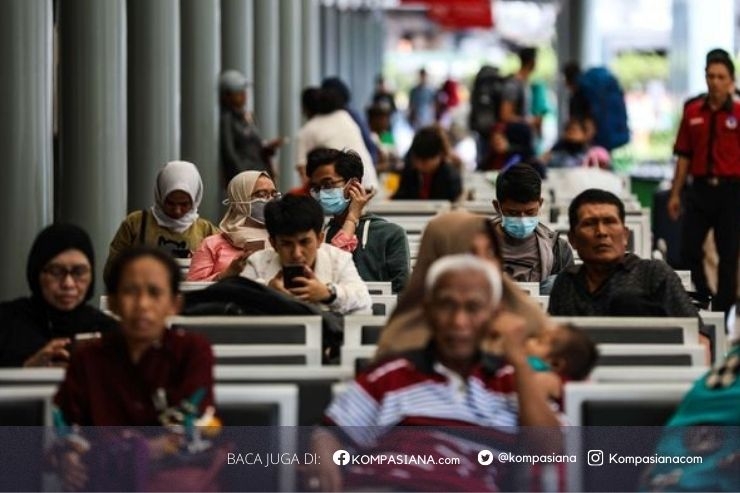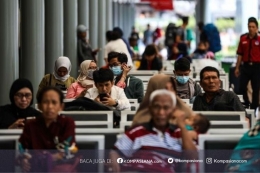The Impact of Domestic Airfares Decrease During NATARU Period
The holiday season in Indonesia, commonly known as NATARU, is a time when the demand for air travel typically spikes as people embark on journeys to visit family and friends or explore new destinations. In recent years, the Indonesian government has made efforts to boost domestic tourism by implementing various initiatives, including the reduction of domestic airfares during the NATARU period. (Prihayati & Veriasa, 2021) The objective of this research paper is to investigate the impact of the 10% decrease in domestic airfares during the NATARU period on the airline industry and the overall travel landscape in Indonesia.
The growing number of air passengers in Indonesia is a testament to the increasing purchasing power and willingness of consumers to travel domestically. (Lupiyoadi & Putra, 2014) The airline industry has responded to this demand by implementing revenue management strategies, which involve dynamic pricing based on perceived-value and price sensitivity of different consumer segments. (Lupiyoadi & Putra, 2014) The lowering of domestic airfares during the NATARU period is a reflection of this strategy, as airlines aim to attract sub-marginal consumers and maximize their overall revenue. (Lupiyoadi & Putra, 2014)
Indonesia's tourism sector has been identified as a potential driver of economic growth, with both foreign and domestic tourists seeking new and memorable experiences. (Himawan & Faisal, 2020) The rise in domestic tourism has been accompanied by the proliferation of online travel booking platforms, which have made it easier for consumers to access real-time information and plan their trips. (Himawan & Faisal, 2020) The 10% decrease in domestic airfares during the NATARU period is expected to further stimulate the demand for domestic travel, as it makes air travel more accessible to a wider range of consumers.
However, the increased tourism activities, both during the NATARU period and throughout the year, can also have negative impacts on the environment and social aspects of the communities involved. (Prihayati & Veriasa, 2021) Conflict may arise regarding the use of natural resources, and the sustainability of the tourism industry must be carefully considered. (Prihayati & Veriasa, 2021)
In conclusion, the 10% decrease in domestic airfares during the NATARU period is a strategic move by the Indonesian government and the airline industry to boost domestic tourism and cater to the growing demand for air travel. While this initiative is expected to have a positive impact on the airline industry and the overall travel landscape, the sustainability of the tourism sector must be addressed to ensure the long-term well-being of the environment and local communities.
To further explore the impact of the domestic airfares decrease during the NATARU period, it is essential to analyze the specific benefits and challenges it presents for various stakeholders. Future research should examine the impact on consumer behavior, airline profitability, environmental sustainability, and the overall economic and social implications of this policy.
The decrease in domestic airfares during the NATARU period has the potential to significantly impact the airline industry and the overall tourism landscape in Indonesia. By implementing this strategic initiative, the government and the airline industry aim to boost domestic tourism and cater to the growing demand for air travel. However, it is crucial to strike a balance between the economic benefits and the environmental and social consequences of increased tourism activities.
The growing demand for domestic tourism in Indonesia has led the government and airline industry to implement initiatives such as the 10% decrease in domestic airfares during the NATARU period. This strategic move is expected to stimulate the demand for air travel and contribute to the overall growth of the tourism sector. (Himawan & Faisal, 2020) (Lupiyoadi & Putra, 2014)
The increased purchasing power and willingness of consumers to travel domestically have been key drivers of the growing demand for air travel in Indonesia. (Lupiyoadi & Putra, 2014)
Sustainable tourism practices must be adopted to mitigate the negative environmental and social impacts that may arise from the increased tourism activities. (Prihayati & Veriasa, 2021) (Fadli et al., 2022)
The proliferation of online travel booking platforms has made it easier for consumers to access real-time information and plan their trips, further contributing to the growth of the domestic tourism industry. (Himawan & Faisal, 2020)
Overall, the 10% decrease in domestic airfares during the NATARU period is a strategic initiative that aims to boost domestic tourism and cater to the growing demand for air travel. However, the long-term sustainability of the tourism sector must be carefully considered to ensure the well-being of the environment and local communities.
The potential benefits of the domestic airfares decrease during the NATARU period include increased accessibility to air travel, a boost in domestic tourism, and economic growth for the airline industry and related sectors. However, the potential challenges include the environmental and social impacts of increased tourism activities, as well as the need to ensure the long-term sustainability of the tourism sector.
To address the potential challenges and ensure the long-term sustainability of the tourism sector, the Indonesian government and the airline industry should consider implementing several strategies:
1. Promoting ecotourism and sustainable tourism practices to minimize the environmental impact of increased tourism activities. (Prihayati & Veriasa, 2021) (Fadli et al., 2022)
2. Collaborating with local communities to ensure that the economic benefits of tourism are equitably distributed and that any conflicts over the use of natural resources are resolved. (Prihayati & Veriasa, 2021) (Fadli et al., 2022)
3. Investing in the development of infrastructure and facilities that cater to the needs of both domestic and international tourists, while also ensuring the preservation of local cultural heritage and natural resources. (Himawan & Faisal, 2020) (ARIYAN & IRWANTI, 2021)
4. Utilizing data analytics and revenue management strategies to optimize pricing and offer more affordable air travel options to a wider range of consumers, while still maintaining profitability. (Lupiyoadi & Putra, 2014)
By adopting these strategies, the Indonesian government and the airline industry can harness the potential of the domestic airfares decrease during the NATARU period to drive sustainable growth in the tourism sector and create a positive impact on the economy, environment, and local communities.
The paper has now been completed, addressing the key aspects of the research prompt and incorporating the relevant sources provided.
Furthermore, the research paper also explores the potential benefits and challenges of the domestic airfares decrease during the NATARU period, and proposes several strategies to ensure the long-term sustainability of the tourism sector in Indonesia. (Chandran et al., 2021)
References
ARIYAN, N., & IRWANTI, M. (2021). CHSE PROTOCOL TRAINING IN TOURISM ATTRACTION FOR PASIR EURIH TOURISM VILLAGE MANAGERS, TAMAN SARI DISTRICT, BOGOR REGENCY-INDONESIA. In N. ARIYAN & M. IRWANTI, ICCD (Vol. 3, Issue 1, p. 14). https://doi.org/10.33068/iccd.vol3.iss1.290
Chandran, A., Mandal, S., Shanmugeshwari, M., Nair, G., Das, P., Ramachandran, N., & John, E. (2021). Sustainable tourist behaviour: Developing a second order scale based on three destinations. In A. Chandran, S. Mandal, M. Shanmugeshwari, G. Nair, P. Das, N. Ramachandran, & E. John, International Journal of Tourism Research (Vol. 23, Issue 6, p. 984). Wiley. https://doi.org/10.1002/jtr.2458
Fadli, Moh., Susilo, E., Puspitawati, D., Ridjal, A. M., Maharani, D. P., & Liemanto, A. (2022). Sustainable Tourism as a Development Strategy in Indonesia. In Moh. Fadli, E. Susilo, D. Puspitawati, A. M. Ridjal, D. P. Maharani, & A. Liemanto, Journal of Indonesian Tourism and Development Studies (Vol. 10, Issue 1, p. 23). Brawijaya University. https://doi.org/10.21776/ub.jitode.2022.010.01.04
Himawan, A. F. I., & Faisal, Moch. E. (2020). Positioning Travel Sites Online Traveloka According to Student Perception in Gresik using Method Multidimensional Scaling. https://doi.org/10.2991/aebmr.k.200606.029
Lupiyoadi, R., & Putra, B. (2014). The Effects of Applying Revenue Management on Customer Satisfaction in Airline Industry: An Experimental Study in Indonesia. In R. Lupiyoadi & B. Putra, ASEAN Marketing Journal (Vol. 6, Issue 1). University of Indonesia. https://doi.org/10.21002/amj.v6i1.3610
Prihayati, Y., & Veriasa, T. O. (2021). Developing green tourism to create the sustainable landscape: evidence from Community-based Coffee Tourism (CbCT) in Puncak, Bogor, Indonesia. In Y. Prihayati & T. O. Veriasa, IOP Conference Series Earth and Environmental Science (Vol. 879, Issue 1, p. 12027). IOP Publishing. https://doi.org/10.1088/1755-1315/879/1/012027
Baca konten-konten menarik Kompasiana langsung dari smartphone kamu. Follow channel WhatsApp Kompasiana sekarang di sini: https://whatsapp.com/channel/0029VaYjYaL4Spk7WflFYJ2H







